Vaccines, fluoride, medical records and more on Thursday legislative docket
The New Hampshire House of Representatives’ Committee on Health, Human Services and Elderly Affairs had a lot on its plate on Thursday here’s a recap.
The New Hampshire House of Representatives’ Committee on Health, Human Services and Elderly Affairs had a lot on its plate on Thursday here’s a recap.
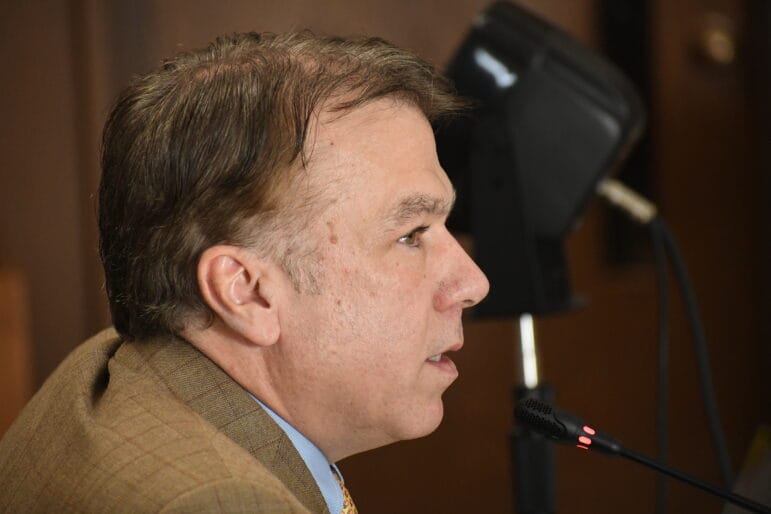
This bill ensures that a parent or guardian has access to the medical records of children under their care.
Bill sponsor Jim Kofalt (R-Wilton) spoke on the bill, which seeks to create statutory language regarding the rights of parents and guardians in situations where they are assumed to be acting in the child’s best interest.
Kofalt said that the bill gives carveouts in certain situations such as family planning and sexually transmitted diseases. He also said that parents can give consent to privacy for children in situations where a child may not feel comfortable talking to a doctor with their parent present, such as in drug use.
In response to a question from Joe Schapiro (D-Keene), Kofalt said language could be “tightened up” in regard to exceptions where disclosure could “endanger the child,” but he did not want to tighten it up too much and tie the hands of the healthcare provider.
The bill also provides carveouts for situations where the parent may be acting for the sake of their own legal interests rather than the best interests of the child such as the New Hampshire Supreme Court Case Berg v. Berg.
However, both Kofalt and the committee struggled with the complexity of patient-provider confidentiality for minors, including under requirements in the Health Insurance Portability and Accountability Act (HIPAA), which oversees patient privacy rights at the federal level.
There was also confusion given the change in rules between children under the age of 12 and children over the age of 12, with the latter getting more privacy exceptions.
Paula Minnehan of the New Hampshire Hospital Association said her organization was opposed to the bill in its current form and was unnecessary given current rules. spokespeople from other organizations echoed the opposition, saying that this could dissuade some children from seeking mental or physical health assistance in certain situations.
Minnehan was insulted by a question from Leah Cushman (R-Weare) asserting that hospitals advised their doctors to withhold information from parents and asking why this happened, saying it was inaccurate and refusing to respond further.
As of Thursday in regard to online testimony, there were 215 people in support of the bill and nine opposed.

This bill seeks to modify the age in which minors can receive mental health treatment without parental consent, allowing anyone at least 16 years old seek that treatment.
Bill sponsor Don Bouchard (D-Manchester) said it would not solve all problems related to mental health for teenagers, but believed clarification could help prevent teenage suicide and other mental health issues.
Erica Layon (R-Derry) asked if non-directive counseling where they could be heard, but not directed toward any guidance with exceptions such as advising against suicide, with Bouchard stating this bill was solely directed toward helping teenagers seek mental health assistance.
Other questions came Lucy Weber (D-Walpole) regarding whether this would dissuade those under 16 from seeking mental health assistance and Mark McLean (R-Manchester) asking if the bill was needed and asked if there were any situations were treatment was denied, among other questions.
As of Thursday, in regard to online testimony, there were 79 people in support of the bill and 200 opposed.
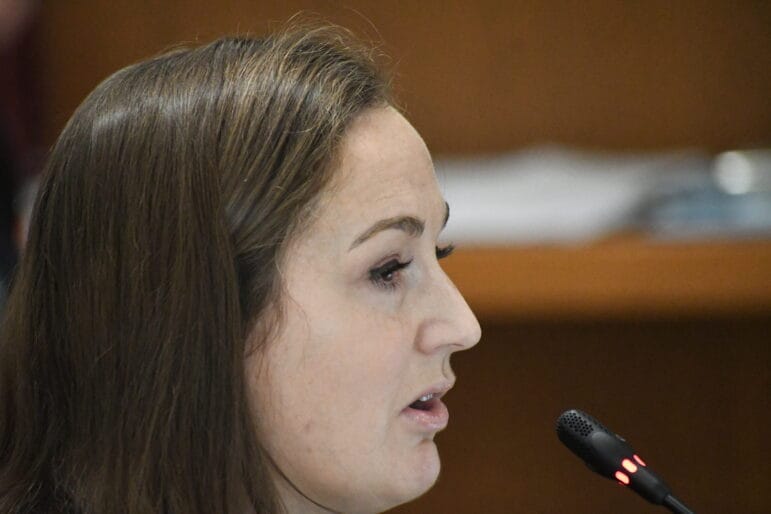
This bill prohibits the state, as well as any public entity in the state, from purchasing vaccine or pharmaceutical products that have not been tested with voluntary, human and clinical trials.
The prohibition would also stop funding on advertisement or other spending on those products.
Prime Sponsor Emily Phillips (R-Fremont) said she is not opposed to science and has received treatment after learning she has Type I Diabetes. However, she addressed concerns that New Hampshire residents were unwittingly enrolled into clinical trials for certain COVID-19 vaccinations during emergency orders in place during the height of the COVID-19 pandemic, leading to potential deaths and other health complications.
This does bill does not private pharmacies or providers from providing any treatments.
Weber asked if this would interfere with the rights of someone that knew the lack of knowledge and still accepted the vaccines, but Phillips said that private providers still could provide those products. Weber then asked if those vaccines would not be available privately, and Phillips said that the government bought all the vaccines during the height of the pandemic
Weber clarified that without government funding, the vaccines would not have been manufactured if there was a need to wait for demand from the market to catch up with the need, to which she didn’t have an answer.
Joe Schapiro (D-Keene) says he agrees that COVID-19 vaccine testing seemed rushed, but it was an emergency situation and he asked Phillips at what point it would make sense to give vaccines to people without testing. Phillips replied that Granite Staters were told that COVID-19 vaccines were told that vaccines were safer than they actually were.
She added that she understood the risks when she underwent trials for medications for her illnesses, but felt that it was not the government’s role to enroll people into clinical trials and informed consent is needed for any medical trials.
Gary Merchant (D-Claremont) expressed concerns that this bill would create a multi-tiered system where people who cannot afford private insurance would not have access to vaccinations they might want.
William Palmer (D-Cornish) asked if the matter was more about informed consent, but Phillips said that the information at that time for this specific vaccine was not available so informed consent could not be given and all she is asking for is that human trials be given.
Mark McLean (R-Manchester) said that adults should have the right to risk-benefit analysis and in emergencies, using the example of a zombie apocalypse, that the state may be the best way to distribute vaccines that adults may want even without human trials. However, he agreed with Phillips in that the government should play a neutral role in regard to promotion of any particular procedure.
Layon asked if Phillips would accept people to opt-in to clinical trials with their informed consent and she said she would be willing to learn more.
Seth King (R-Whitefield) then asked if there was a conflict of interest regarding pharmaceutical companies making significant profits from urging the government toward promoting certain products, to which she agreed.
Experts, including New Hampshire State Epidemiologist Dr. Benjamin Chan, spoke in opposition to the bill, noting that federal law prohibits the use of involuntary subjects in medical trials, this bill could harm those seeking the influenza vaccine and it would raise costs for individuals due for the need to obtain vaccines through private means.
Chan added that the broad language of the bill could have unintended consequences of other medications beyond vaccines.
In response to a question from Schipiro, Chan said that it is not appropriate for health departments to request informed consent, as informed consent is between a patient and a healthcare provider and generally outside of an emergency, health departments and government agencies do not administer medications directly to patients.
Layon asked for a list of medications and vaccines at risk from this legislation, and Chan said a full list is not available because the intent of the bill is not clear regarding what types of human medical trials this bill addresses
Weber asked if it was too simplistic if only the rights of the person receiving the vaccine and the rights of people that could be infected by a disease by someone not taking a vaccine, stating that both of those rights are deeply personal and fundamental and a balance must be found. Chan said that public health agencies aim to help find that balance and the focus in his testimony the impacts of this bill could have unintended consequences for numerous public agencies.
Lisa Mazur (R-Goffstown) asked at which point should vaccines stop being recommended if they are seen to be not effective. Chan said that vaccination as a concept is effective and expectations need to be set at what is being addressed by vaccines. He added that there were early expectations that vaccines would be very effective and they have remained effective even though data related to those vaccinations has changed as COVID-19 as new variants have emerged.
Chan challenged information related to COVID-19 related deaths, stating that usually people in COVID-19-related deaths die from the disease or other chronic diseases and not the vaccines themselves. He acknowledged an exception with myocarditis with teenagers, but even here the risks of not taking the vaccine outweighed the benefits.
Seth King expressed concern that government bureaucrats have a blank check to make unilateral decisions and asked how elected officials can provide oversight. Chan said that public medical professionals prefer not to legislate medical care and that there is a system in place to ensure that medical procedures are safe and then an entire network of providers confirming those findings independently.
McLane asked what the role of the state should be regarding the promotion of vaccines and that information does not get down to patients. In response, there were concerns with answering that question regarding the vagueness of the term “promotion” in this bill.
Dr. Meryl Nass, a doctor suspended for COVID practices, said she is support of the bill given various issues related with vaccine development and concerns about international government efforts to rush out vaccines at an unsafe speed.
Nass said that the only vaccine given without human trials is the flu vaccine and it has been generally safe for decades.
McLean repeated his questions regarding providing information to patients and Nass agreed that patients should be allowed to do what they want given proper information, but many individuals that administration COVID-19 vaccines at the height of the pandemic were not properly qualified to provide that information given the emergency authorizations in place. Nass later added that COVID-19 vaccines don’t really work and there has been no real cost/benefit analysis to the vaccine in the U.S.
Nass also said that public health has been politicized and is now largely now beholden to commercial interests.
After Nass, Committee Chair Wayne McDonald (R-Derry) instituted a “rolling lunch” with members of the committee allowed to go to lunch or stay while testimony continued.
Testimony from other experts included concerns about impacts to long-term care facilities and possible violations to the Americans with Disabilities Act
As of Thursday, in regard to online testimony, there were 201 people in support of the bill and 54 opposed.
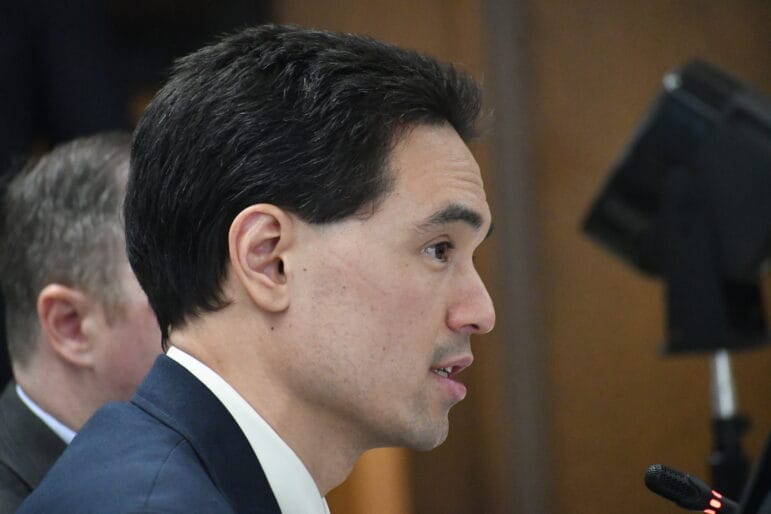
This bill limits the authority of the New Hampshire Department of Health and Human Services’ rulemaking authority when it comes to requirements of parents to get their children immunized against certain diseases.
Kofalt, one of the bill’s sponsors, said he has concerns about administrative rules relating to immunizations being made by unelected experts within state departments rather than elected officials in the legislature. Although he says that New Hampshire Department of Health and Human Services Commissioner Lori Weaver has done a good job regarding caution on immunization rules, he feared what future commissioners might do.
Shapiro asked if partisan turmoil might impact the decision making process regarding this issue in the future. Kofalt responded that healthy debate is good and it should be incumbent upon legislators to prevent things from getting heated.
In response to a question from Cushman, Kofalt said that the deliberation process is much more detailed for legislation-making than rule-making.
He also expressed concern about any amendments that could water down the bill. In response to a question from McLean, Kofalt said that the governor can also act in emergency situations.
New Hampshire Department of Health and Human Services Representative Ryan Tannian and Chan returned to oppose this bill, with Tannian stating that the current process regarding vaccines and schools is transparent and seeks input from the public, legislature and other stakeholders.
Chan is concerned that if the legislature does not put several well-tested immunizations into law such as the varicella shot, that people with immune system deficiencies could be put at risk and there could be outbreaks of current controlled infectious diseases.
Weber confirmed with Chan and Tannian that hearings from state departments have publicly advertised hearings for rulemaking procedures.
They also indicated that the state does not intend to add the COVID-19 vaccine as a required vaccination for students in New Hampshire as Chan believed that it will likely become an annual booster vaccine.
Former State Representative Jerry Knirk (D-Freedom) also spoke in opposition to the bill, stating that a shift in just a few percentage points can make a big difference in terms of public health, reiterating earlier testimony regarding the importance of disease prevention efforts in protecting those beyond the individuals who get the vaccinations and immunizations and the lack of speed in the legislative process during emergencies.
Knirk added in response to a question from Shapiro that there is a significant amount of disinformation regarding to public health.
Other experts that have travelled to other countries without large scale immunization and unvaccinated populations testified on how they’ve seen children die of easily treatable diseases in the US and that Americans have been safe from some of these diseases for so long that they have forgotten the importance of immunizations and vaccinations.
Other supporters of the bill expressed concern about potential conflicts of interest and perceived lack of oversight in the rulemaking process as well as situations where they say children have seen side effects from vaccinations.
As of Thursday, in regard to online testimony, there were 201 people in support of the bill and 137 opposed.
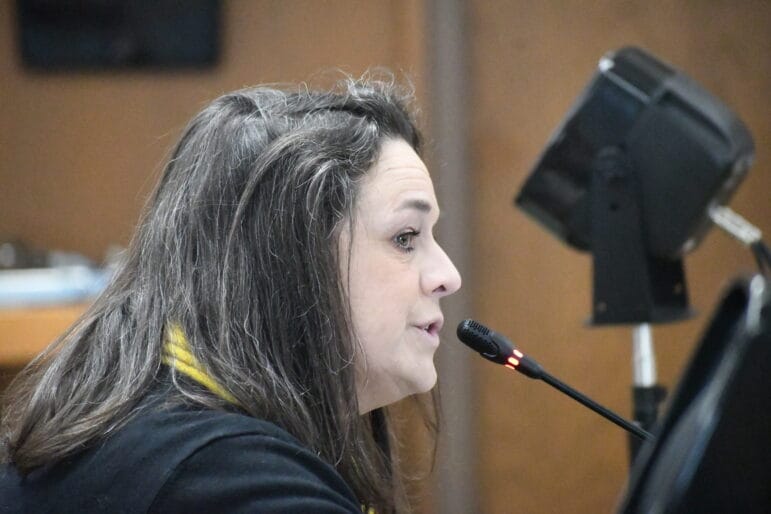
This bill requires that any foster children currently living in a foster home shall be subject to the same immunization and vaccination requirements and exceptions of any other child in the state.
Kofalt, a sponsor on the bill, said it referenced a complicated situation where rulemaking bodies delegate their authority to third parties such as the Centers for Disease Control.
He added that foster children do not have the same due process as other children as they do not have access to a religious exemption.
He also added that some potential parents are concerned about the COVID-19 vaccine as a requirement for adoption.
Weber said that she believed that this is not directly about the foster children, but other children living under the care of foster parents, which Kofalt confirmed.
He also added an upcoming amendment he has filed to address other children living with foster parents who are not foster children.
Layon asked if there is a shortage of foster families, with a representative from the Division of Children Youth and Families stating that there is not an abundance of applicants, but the number has been growing since the end of the COVID-19 pandemic.
Kelly Potenza (R-Rochester) said that situations related to this issue led foster parents move out of the state.
In response to a question from Seth King regarding choice over vaccines for foster parents, Potenza called the situation discriminatory.
As of Thursday, in regard to online testimony, there were people in 203 support of the bill and one opposed.
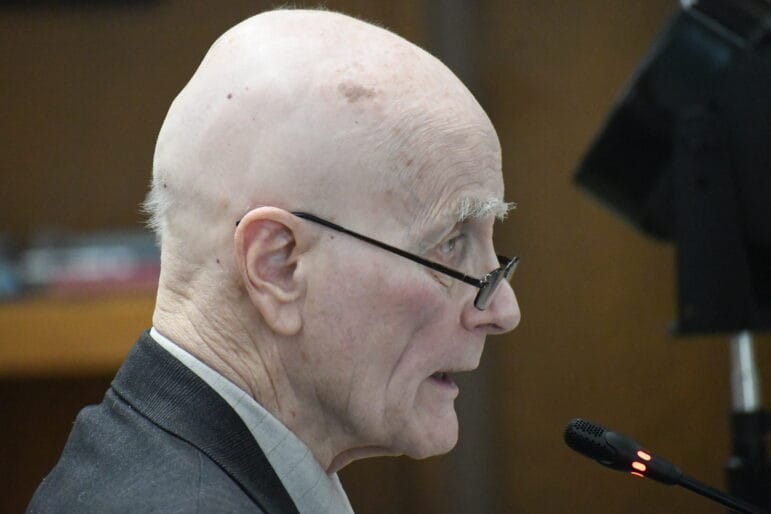
This bill establishes a committee to study the effects of fluoride and fetuses on children.
Bill sponsor Peter Schmidt (D-Dover) said he developed concerns about the issue after hearing studies about the impact on fluoride and felt it was a matter of extreme urgency.
Currently 199 municipalities in New Hampshire do not have fluoride in their water supplies.
Shapiro asked Schmidt what legislation might come out of this, Schmidt did not want to direct the study committee, but hoped that the latest and best science should be used in studying the issue.
Layon asked if Schmidt would serve on the committee, although he would although his age might be a factor
Dr, Brenda Burkal of the New Hampshire Dental Society spoke in opposition to the bill, stating that the study committee would give air time to support those opposed to the use of fluoride in dental health.
Other health advocates and dental experts spoke against the bill, stating that concerns over fluorosis are minor compared to the benefits related to the impact of fluoride on dental health, especially for children.
King said that there would be no guarantee that members of the study committee would be opposed to fluoride, but Burkal said there has already been massive studies of fluorides over the past 80 years.
Phillips returned to state that fluoride is a neurotoxin and was unsure why there would be opposition to the bill.
“What are we so afraid of, the truth?” said Phillips.
Cushman asked if there are other studies to an individual testifying in support of the bill, learning that there are ongoing studies in Hawaii, Oklahoma and Pennsylvania.
As of Thursday, in regard to online testimony, there were 76 people in support of the bill and none opposed.
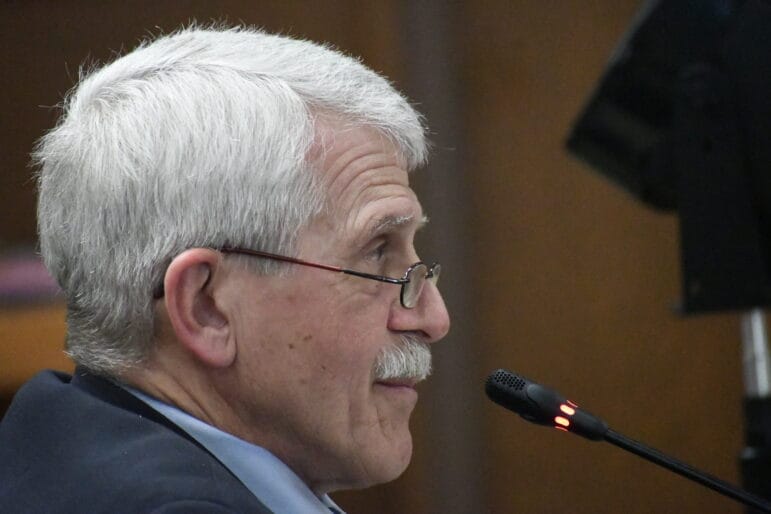
This bill establishes a blood lead level testing requirement for children entering day care and public schools.
Prime sponsor Nancy Murphy (D-Merrimack) gave her time to Knirk, who explained the lack of controversy and importance of lead level testing in children and how this bill builds upon earlier efforts relating to the same topic.
Knirk said that this bill does not remove existing exceptions and not place undue additional administrative burdens on day care and schools.
He said that catching just one child before they receive lead poisoning that the cost savings would be significant and also said that certain ages of young children and children in after school programs likely do not to be included in testing.
“It’s time to get the lead out,” said Knirk
Bill King (R-Milford) asked why the focus should not be toward remediation of homes built before 1980 that may still have lead paint, with Knirk saying that has estimated at a cost of $1 billion in New Hampshire.
Representatives from the New Hampshire Department of Health and Human Services supported the bill, but felt that it could be strengthened by also including younger children, noting similar efforts already in place in Claremont.
A representative of the New Hampshire Alliance of YMCAs spoke on the bill, supporting the concept of the bill, but expressing concerns over potential difficulty for parents to pay for testing and obtain forms. He also had concerns that child care providers may be liable if parents do not act upon testing.
Phillips spoke against the bill given her personal experience when her brother was diagnosed with lead poisoning when he was two years old and their family had to leave their home for an extended period, fearing that this bill could have similar impacts.
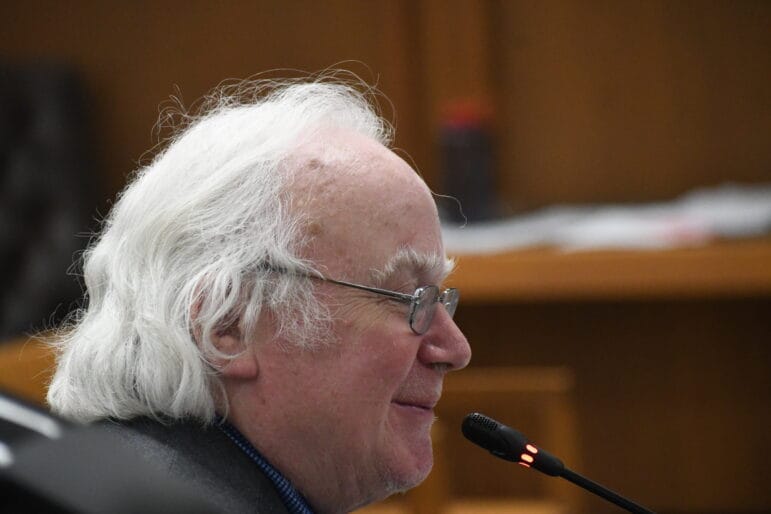
This bill looks to repeal a statute that gives the right to freedom from mandatory immunization.
Prime Sponsor Timothy Horrigan (D-Durham) said there is no constitutional right to spread communicable diseases and millions of people have died during the COVID-19 pandemic and said preventative efforts can help address the issue.
In response to questioning from Layon, Horrigan said the COVID-19 vaccine is not completely effective, but it is better than doing nothing.
Schapiro asked what would be different if this law was repealed. Horrigan said that COVID-19 is still peaking in some places and people are dying and colleagues within the legislature have also died from COVID-19
Gerri Cannon (D-Somersworth) asked if there had been any violations of the statute since it became law, with Horrigan saying he was unaware of any.
Former State Representative Melissa Blasek (R-Merrimack) now representing Rebuild NH noted that this bill unanimously passed this committee last year and the statute protects bodily autonomy.
As of Thursday, in regard to online testimony, there were 68 people in support of the bill and 217 opposed.




